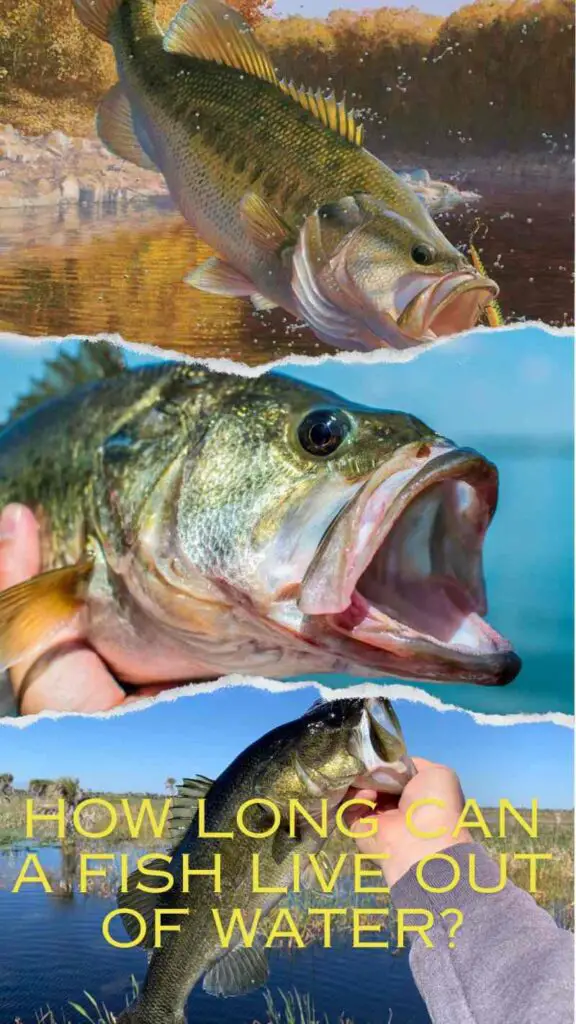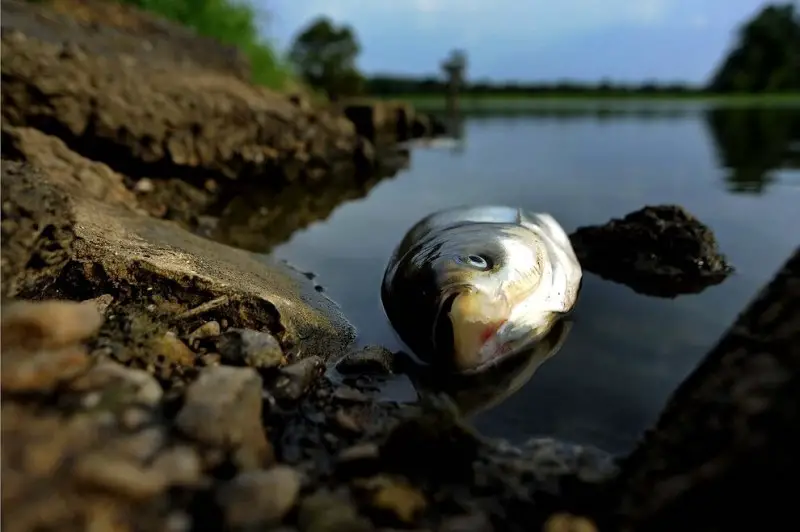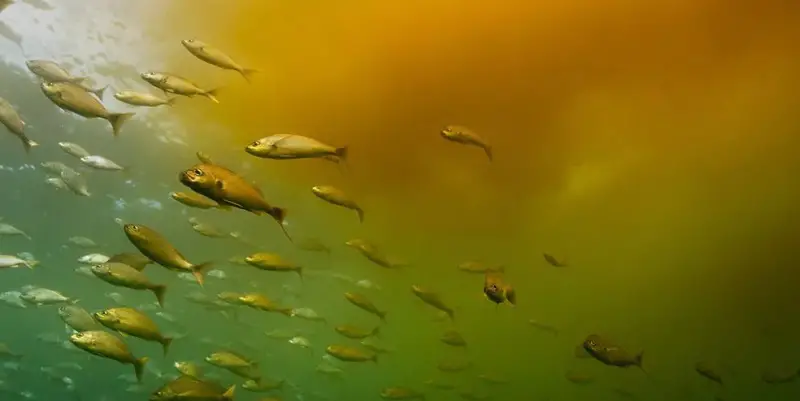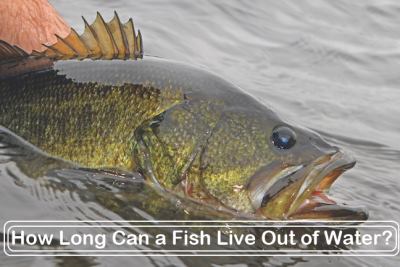The world beneath the water’s surface is a mysterious realm where fish navigate effortlessly using their gills, specialized organs designed for extracting oxygen from water. However, curiosity often leads us to wonder, “How long can a fish live out of water?” In this exploration, we’ll delve into the intricacies of fish physiology, the adaptations that enable survival, and the various factors influencing their endurance in unfamiliar environments.

Understanding the survival limits of fish outside their aquatic habitat is crucial for both scientists and enthusiasts. Fish, with their diverse species and adaptations, offer a fascinating study into the complexities of life beyond the water’s edge.
Table of Contents
Fish Physiology
Fish utilize gills to respire, extracting dissolved oxygen from their aquatic surroundings. This distinctive respiratory mechanism distinguishes them from terrestrial creatures, prompting inquiries regarding their capacity to endure in terrestrial environments. Their reliance on gills showcases an evolutionary adaptation finely tuned to underwater life, emphasizing the contrast between the respiratory systems of fish and their land-dwelling counterparts. This adaptation not only underscores the marvels of fish physiology but also underscores the challenges and curiosities surrounding their potential survival beyond the aqueous realm.
Adaptations for Survival
Specific fish varieties exhibit notable adjustments to thrive outside water, showcasing modified respiratory patterns and behavioral shifts. These modifications prove vital in addressing the hurdles associated with the transition from aquatic to terrestrial surroundings. The ability of certain fish species to adapt their breathing and behavior highlights the intricacies of their survival strategies. Such adaptations are honed through evolution, enabling them to navigate the challenges presented by environments both in and out of the water. Understanding these nuances not only deepens our appreciation for the resilience of aquatic life but also underscores the diversity of strategies employed by different fish species for their survival.
Factors Influencing Survival Time
A fish’s size and the surrounding environmental conditions substantially influence its survival duration outside water. Larger fish encounter heightened challenges during this transition, facing distinct hurdles. Concurrently, variables such as temperature and humidity play pivotal roles in shaping the endurance of fish out of their natural aquatic habitat. These factors collectively underscore the nuanced relationship between a fish’s physical characteristics, environmental dynamics, and its ability to withstand the complexities of survival in non-aquatic environments.
Case Studies
Abundant documented cases attest to fish displaying survival capabilities outside their natural aquatic habitat, offering valuable insights into their resilience. In-depth scientific studies and keen observations contribute significantly to understanding the strategies fish employ to endure in environments beyond their typical aquatic homes. These instances serve as windows into the adaptive mechanisms and behaviors developed by various fish species when faced with the challenges of transitioning from water to land, adding layers to our comprehension of their remarkable ability to navigate diverse ecosystems.
Challenges Faced by Fish Out of Water

Dehydration and stress emerge as fundamental obstacles confronting fish when displaced from their native habitats. Grasping the intricacies of these challenges holds paramount importance in advocating for the overall welfare of fish in diverse environments. Recognizing the impact of dehydration and stress on fish beyond their natural aquatic homes underscores the responsibility to establish conditions that mitigate these challenges. This understanding is pivotal for anyone involved in the care, management, or study of fish in settings that deviate from their accustomed aquatic ecosystems, emphasizing the need for thoughtful consideration and proactive measures to ensure their well-being.
Aquatic Habitats and Survival
Distinct aquatic environments pose diverse challenges for fish adapting to terrestrial conditions. Delving into these ecosystems provides valuable insights into the adaptability and constraints fish encounter. The exploration of different aquatic habitats aids in comprehending the spectrum of challenges faced by fish when transitioning from water to land. This nuanced understanding enhances our awareness of the intricacies involved in the survival of fish outside their natural aquatic realm. Acknowledging the varied conditions and obstacles presented by different aquatic settings contributes to a holistic perspective on fish adaptability, fostering a deeper appreciation for the complex interplay between environmental factors and the resilience of aquatic life.
Human Impact on Fish Survival
The detrimental impact of human activities, particularly pollution, poses significant threats to the survival of fish, impacting both aquatic and terrestrial environments. The imperative role of conservation efforts becomes apparent in mitigating these threats and safeguarding aquatic ecosystems. Human-induced activities, marked by pollution, present challenges to the well-being of fish not only within water bodies but also when they venture onto land. Recognizing the critical role that conservation initiatives play in addressing and minimizing these impacts is essential for promoting the sustainability of aquatic ecosystems, emphasizing the interconnectedness of human actions and the health of diverse aquatic environments.
Common Misconceptions
It is imperative to debunk misconceptions surrounding the survival of fish outside water to foster the dissemination of accurate information. Grasping the genuine limitations fish face in terrestrial environments holds significance in advocating for responsible pet ownership and environmental conservation. Addressing and dispelling misconceptions not only ensures that individuals possess accurate knowledge about the adaptability of fish but also contributes to ethical practices in keeping fish as pets. Moreover, this understanding plays a vital role in promoting broader environmental conservation efforts, as it encourages a more informed and responsible approach towards aquatic life, emphasizing the importance of coexisting harmoniously with diverse ecosystems.
Evolutionary Perspectives
Over the course of millions of years, fish have undergone evolutionary transformations, crafting intricate mechanisms essential for their survival. Scrutinizing their evolutionary trajectory yields valuable insights into the adaptive strategies that empower fish to flourish in a wide array of environments. The gradual evolution of fish showcases the refinement of specialized features and behaviors honed through time, illustrating their ability to navigate and thrive in diverse ecological landscapes. Examining this evolutionary journey not only unravels the fascinating history of fish but also provides a deeper understanding of the resilience embedded in their biology, shedding light on the dynamic interplay between evolutionary processes and the diversity of aquatic habitats.
The Role of Mucus
The significance of fish mucus, frequently underestimated, lies in its protective function during survival outside water. Scientific research underscores the vital role of this slimy secretion as a crucial defense mechanism against dehydration and various threats. Often overlooked, fish mucus emerges as a remarkable adaptation, forming a protective barrier that helps maintain their physiological balance when transitioning from aquatic to terrestrial environments. The findings of research highlight the multifaceted nature of this secretion, emphasizing its pivotal contribution to the overall well-being of fish when faced with challenges beyond their accustomed aquatic habitats. Understanding and acknowledging the role of fish mucus unveils yet another layer of their adaptive strategies for thriving in diverse conditions.
Aquarium Practices
Ensuring the well-being of fish kept in aquariums hinges on meticulously maintaining optimal conditions. Establishing guidelines for water quality, temperature, and humidity becomes paramount in recreating a conducive environment for captive fish. Those engaged in aquarium care must adhere to these guidelines to mimic the natural habitat, fostering a setting where fish can thrive and exhibit their natural behaviors. The careful balance of water quality, temperature, and humidity not only promotes the health of captive fish but also reflects a responsible and compassionate approach to creating a sustainable environment within the confined space of an aquarium.
Unusual Cases of Fish Survival

Surpassing the commonplace, documented instances reveal fish thriving in unexpected circumstances. These exceptional occurrences defy conventional understanding of fish biology, sparking a compelling inquiry into their extraordinary capabilities. These anomalies not only broaden our perspective on the adaptability of fish but also serve as catalysts for deeper exploration, inviting scrutiny into the intricacies of their remarkable abilities. Such instances, which transcend conventional expectations, fuel scientific curiosity, propelling researchers to delve into the underlying mechanisms that enable certain fish species to not only survive but flourish in environments considered unconventional or challenging. This continuous exploration contributes to an evolving comprehension of the diverse and remarkable capacities inherent in the world of aquatic life.
Conservation Implications
Grasping the duration a fish can endure outside its natural aquatic habitat bears significance for conservation endeavors. Acknowledging the strengths and vulnerabilities of fish across diverse environments is pivotal in striving towards the preservation of aquatic ecosystems. By comprehending the intricacies of their survival, conservationists can formulate targeted strategies to mitigate challenges posed by factors such as pollution and habitat degradation. This understanding fosters a proactive approach, emphasizing the need to protect the delicate balance of aquatic ecosystems, ensuring the sustained well-being of fish populations and the ecosystems they inhabit.
Conclusion
In conclusion, the question of how long a fish can live out of water is complex and multifaceted. From the physiological intricacies of fish gills to their evolutionary journey, every aspect contributes to their ability to endure beyond the water’s edge. As we continue to unravel the mysteries of fish survival, it becomes evident that their resilience is both fascinating and delicate.
FAQ
What factors influence a fish’s ability to endure outside water?
A fish’s ability to endure outside water is influenced by several factors. Size plays a crucial role, with larger fish facing more challenges due to increased demands on their respiratory systems. Environmental conditions, such as temperature and humidity, also significantly impact survival. Certain fish species have evolved specific adaptations for brief excursions on land, contributing to their resilience. Additionally, the duration of exposure affects survivability, with shorter periods being less stressful for the fish. Understanding these factors is essential for those engaged in aquarium care and contributes to broader conservation efforts by recognizing the limitations and strengths inherent in a fish’s ability to navigate terrestrial environments.
Do different fish species have varying survival times on land?
Certainly, different fish species exhibit varying survival times on land. These differences stem from the diverse adaptations each species has evolved over time. Some species, particularly those adapted to oxygen-poor environments, may display remarkable resilience for brief periods outside water. Additionally, factors like size, physiology, and environmental conditions contribute to the variation. Larger fish often face more challenges due to increased oxygen demands and susceptibility to dehydration. Scientific studies and observations have documented these distinctions, shedding light on the impressive adaptability of certain species while highlighting the limitations others may face. This diversity underscores the need for tailored care in aquarium settings and underscores the complex interplay of biological and environmental factors in fish survival on land.
How does size affect a fish’s capacity to live out of water?
Size significantly influences a fish’s ability to survive outside water. Larger fish encounter more challenges due to increased oxygen demands and a higher risk of dehydration. Smaller fish generally have a greater surface area-to-volume ratio, enabling more efficient oxygen exchange through their skin. Additionally, larger fish may experience greater stress during the transition from water to land. Their physiological processes, including respiration and hydration, become more demanding. Understanding these size-related dynamics is crucial in aquarium management, as it guides the establishment of suitable conditions for fish of varying sizes. Moreover, it contributes to a broader comprehension of the intricacies involved in fish survival outside their natural aquatic habitats.
What is the significance of fish mucus in their survival out of water?
Fish mucus holds significant importance in their survival out of water. This slimy secretion serves as a crucial protective barrier, aiding in the prevention of dehydration and acting as a defense mechanism against various threats. The mucus layer helps maintain the fish’s physiological balance during transitions from aquatic to terrestrial environments. It serves as a shield, reducing the risk of external stressors and supporting the fish’s adaptability. Scientific research indicates that understanding the role of fish mucus contributes to a more comprehensive grasp of their survival strategies. This knowledge is vital for aquarium practices, emphasizing the need to recreate conditions that respect and utilize the protective function of fish mucus.
Are there specific adaptations that help certain fish survive outside water?
Yes, specific adaptations exist that enable certain fish to survive outside water. Some fish species have evolved physiological and behavioral traits for brief excursions on land. Modified breathing patterns, altered metabolism, and the ability to absorb oxygen through their skin are examples of adaptations that enhance their resilience. Additionally, certain species exhibit mobility adjustments, aiding their navigation in terrestrial environments. These adaptations are often species-specific, reflecting the diverse evolutionary pathways different fish have taken to cope with temporary exposure to non-aquatic conditions. Understanding these specialized adaptations is crucial for comprehending the varied survival strategies employed by fish when navigating environments beyond their natural aquatic habitats.
Our best posts:
- Lifetime Kayak Reviews;
- Ideas and Suggestions for Funny Kayak Names;
- Best Ultralight Spinning Reel;
- Best Kayak Cart For Sand;
- Best Fish Finder For Kayak;
- Best Monofilament Fishing Line For Spinning Reels;
- Vibe Shearwater 125 Review;
- Best Kayaks for Dogs;
- Best Inflatable Kayak For Whitewater;
- Kayak Trolling Motors.

